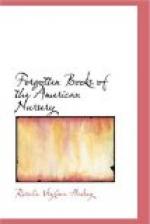By the close of the century Miss Edgeworth was beginning to supersede Mrs. Barbauld in England; but in America the taste in juvenile reading was still satisfied with the older writer’s little Charles, as the correct model for children’s deportment, and with Giles Gingerbread as the exemplary student. The child’s lessons had passed from “Be good or you will go to Hell” to “Be good and you will be rich;” or, with the Puritan element still so largely predominant, “Be good and you will go to Heaven.” Virtue as an ethical quality had been shown in “Goody Two-Shoes” to bring its reward as surely as vice brought punishment. It is to be doubted if this was altogether wholesome; and it may well be that it was with this idea in mind that Dr. Johnson made his celebrated criticism of the nursery literature in vogue, when he said to Mrs. Piozzi, “Babies do not want to be told about babies; they like to be told of giants and castles, and of somewhat which can stretch and stimulate their little minds."[141-A]
The learned Doctor, having himself been brought up on “Jack the Giant Killer” and “The History of Blue Beard,” was inclined to scorn Newbery’s tales as lacking in imaginative quality. That Dr. Johnson was really interested in stories for the young people of his time is attested by a note written in seventeen hundred and sixty-three on the fly-leaf of a collection of chap-books: “I shall certainly, sometime or other, write a little Story-Book in the style of these. I shall be happy to succeed, for he who pleases children will be remembered by them."[141-B]
In America, however, it is doubtful whether any true critical spirit regarding children’s books had been reached. Fortunately in England, at the beginning of the next century, there was a man who dared speak his opinion. Mrs. Barbauld and Mrs. Trimmer (who had contributed “Fabulous Histories” to the juvenile library, and for them had shared the approval which greeted Mrs. Barbauld’s efforts) were the objects of Charles Lamb’s particular detestation. In a letter to Coleridge, written in 1802, he said:




